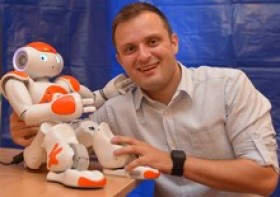
VASC Seminar
October

3:00 pm to 4:00 pm
Event Location: NSH 1507
Bio: Ognjen Rudovic received a PhD from Department of Computing, Imperial College London, UK, in 2014, an MSc degree in Computer Vision and Artificial Intelligence from Computer Vision Centre (CVC), Barcelona, Spain, in 2008, and BSc in Automatic Control Theory from Electrical Engineering Dept., University Of Belgrade, Serbia, in 2007. He is currently a Research Fellow at the Computing Dept., Imperial College London, UK. His research interests include computer vision and machine learning, with a particular focus on Bayesian learning and inference methods, and their application to face analysis, Human Robot Interaction and autism. He is a member of Intelligent Behaviour Understanding Group (IBUG) at Imperial College London (http://ibug.doc.ic.ac.uk/people/orudovic).
Abstract: Automated analysis of human facial behaviour has received a significant research attention over the last decade due to its practical importance in areas such as human-computer interaction, social robotics, and clinical diagnosis of various neurodevelopmental conditions, to mention but a few. However, modelling human facial behaviour is rather challenging as it is a highly non-linear dynamic process driven by many internal and external factors, including ‘who’ the observed subject is, ‘what’ his/her current task is, ‘where’ he/she is, and so on. All this makes the modelling task highly context-sensitive. In this seminar, I will introduce Conditional Ordinal Random Fields (CORF) models for learning spatio-temporal and context-sensitive representations of human facial behaviour. I will then show how these models can be used to automatically estimate intensity of facial expressions of emotions, facial action units and facial expressions of pain. I will also demonstrate their performance in the task facial expression estimation from individuals with autism spectrum conditions.